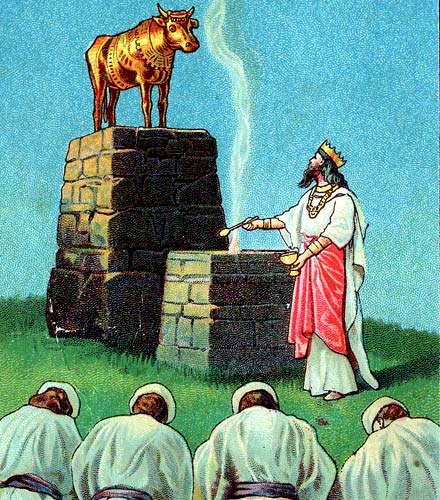"FAQs Mondays" is an ongoing series of posts based on an adaptation of
The Baptist Catechism. You can view the original documents from which it is drawn:
here,
here, and
here. Previous posts include: "
the Introduction", "
What Is the Chief End of Man?",
"Who Is God?",
"What is the Word?",
"What is God?",
"How Does God Work within His Creation?",
"What Went Wrong?" and
"Was That the End of the Story?". Last week, we learned that the fall of man was not the end of the story. God had a plan to redeem mankind. We were introduced to the Redeemer, the Lord Jesus Christ, and how he became a man. This week we are going to look at his work as the Redeemer. What is the work of the Redeemer?
What offices does Christ perform as our Redeemer?
Christ, as our Redeemer, performs the offices of a prophet, of a priest, and of a king, both in his condition of humiliation and exaltation. Speaking of Christ, Peter states, "Moses said, 'The Lord God will send raise up for you a prophet like me from your brothers. You shall listen to him in whatever he tells you'" (Acts 3:22). The author of Hebrews tells us, concerning Jesus, "As he [God] says in another place, 'You are a priest forever, after the order of Melchizedek'" (Heb. 5:6). David tells us that the Christ is a King. David records the Lord's words, "As for me, I have set my King on Zion, my holy hill" (Ps. 2:6).
How does Christ perform the office of a prophet?
Christ performs the office of a prophet in revealing to us, by his Word of Spirit, the will of God for our salvation. Jesus reveals the Father to us. John states, "No one has ever see God; the only God, who is at the Father's side, he has made him known" (John 1:18). The Spirit comes to reveal Christ's teaching. Jesus states, "But the Helper, the Holy Spirit, who the Father will send in my name, he will teach you all things and bring to your remembrance all that I have said to you" (John 14:26). Jesus also says, "No longer do I call you servants, for the servant does not know what his master is doing; but I have called you friends, for all that I have heard from my Father I have made know to you" (John 15:15).
How does Christ perform the office of a priest?
Christ performs the office of a priest by once offering himself as a sacrifice to satisfy divine justice, and to reconcile us to God; and by making continual intercession for us before God. The author of Hebrews states, "Therefore he had to be made like his brothers in every respect, so that he might become a merciful and faithful high priest in the service of God, to make propitiation for the sins of the people" (Heb. 2:17). He also says, "Consequently, he is able to save to the uttermost those who draw near to God through him, since he always lives to make intercession for them" (Heb. 7:25). Again he states, "So Christ, having been offered once to bear the sins of many, will appear a second time, not to deal with sin but to save those who are eagerly waiting for him" (Heb. 9:28). Peter states, "He himself bore our sins in his body on the tree, that we might die to sin and live to righteousness" (1 Pet. 2:24). See also Romans 8:34 and Ephesians 5:2.
How does Christ perform the office of a king?
Christ performs the office of a king, in subduing us to himself, in ruling and defending us, and in restraining and conquering all his and our enemies. Gabriel, an angel of God, said of Christ, "He will be great and will be called the Son of the Most High. And the Lord God will give to him the throne of his father David, and he will reign over the house of Jacob forever, and of his kingdom there will be no end" (Luke 1:32-33). Matthew relates this prophecy, "And you, O Bethlehem, in the land of Judah, are by no means least among the rulers of Judah; for from you shall come a ruler who will shepherd my people Israel" (Matt. 2:6). David recounts, "The LORD said to my Lord: 'Sit at my right hand, until I make your enemies your footstool.' The LORD sends forth from Zion your mighty scepter. Rule in the midst of your enemies" (Ps. 110:1-2). Paul tells us, "For he [Christ] must reign until he has put all his enemies under his feet" (1 Cor. 15:25).
What do we mean by Christ's humiliation?
By Christ's humiliation we mean that he was born, and that in a low condition; that he was made under the law, and underwent the miseries of this life, the wrath of God, and the cursed death of the cross; that he was buried, and continued under the power of death for a time. Paul tells us, "But when the fullness of time had come, God sent forth his Son, born of a woman, born under the law, to redeem those who were under the law, so that we might receive adoption as sons" (Gal. 4:4). Paul also states,
Have this mind among yourselves, which is yours in Christ Jesus, who, though he was in the form of God, did not count equality with Go a thing to be grasped, but made himself nothing, taking the form of a servant being born in the likeness of men. And being found in human form, he humbled himself by becoming obedient to the point of death, even death on a cross (Phil. 2:5-8).
Here are a few more verses to meditate on: Matthew 12:40, 27:46; Luke 2:7, 22:44; Isa. 53:3 and Mark 15:45-46.
What do we mean by Christ's exaltation?
By Christ's exaltation we mean his rising again from the dead on the third day, ascending up into heaven, sitting at the right hand of God the Father, and coming to judge the world at the last day. Paul reminds us, "that he was buried, that he was raised up on the third day in accordance with Scripture" (1 Cor. 15:4). After the ascension, two angels told the disciples, "Men of Galilee, why do you stand looking into the heaven? This Jesus, who was taken up from you into heaven, will come again the same way you saw him go into heaven" (Acts 1:11). Paul warned the Athenians, "The times of ignorance God overlooked, but now he commands all people everywhere to repent, because he has fixed a day on which he will judge the world in righteousness by a man whom he has appointed; and of this he has give assurance to all by raising him from the dead" (Acts 17:30-31).
Conclusion
Thus, the work of the Redeem is clear. He works out mankind's redemption through the functions of his offices: prophet, priest, and king. As our prophet he reveals the Father and his will to us. As our priest he cleanses and purifies us by offering his body as a sacrifice, and by praying for us. As our King he leads and protects us. In order for him to fulfill these offices, he had to endure humiliation (becoming human, subject to the law, death on the cross, and burial). However, for enduring such humiliation
"God has highly exalted him and bestowed on him the name that is above every name, so that at the name of Jesus every knee should bow, in heaven and on earth and under the earth, and every tongue confess that Jesus Christ is Lord to the glory of God the Father" (Phil. 2:9-11).
Now that we know what the Redeemer did for us, we will turn our attention to how redemption is applied. Next week, we will look at the question: "How do we get redeemed?"








